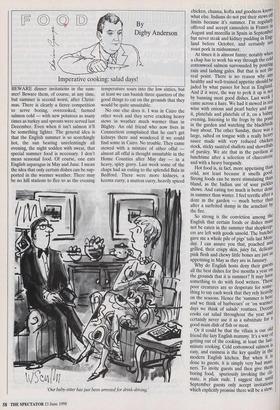By Digby Anderson Imperative cooking: salad days!
BEWARE dinner invitations in the sum- mer! Beware them, of course, at any time, but summer is second worst, after Christ- mas. There is clearly a fierce competition to serve boring, overcooked, farmed salmon cold — with new potatoes as many times as turkey and sprouts were served last December. Even when it isn't salmon it'll be something lighter. The general idea is that the English summer is so scorchingly hot, the sun beating unrelentingly all evening, the night sodden with sweat, that special summer food is necessary. I don't mean seasonal food. Of course, one eats English asparagus in May and June. I mean the idea that only certain dishes can be sup- ported in the warmer weather. There may be no hill stations to flee to as the evening temperature soars into the low sixties, but at least we can banish three quarters of the good things to eat on the grounds that they would be quite unsuitable.
No one else does it. I was in Cairo the other week and they serve cracking heavy stews in weather much warmer than in Blighty. An old friend who now lives in Connecticut complained that he can't get kidneys there and wondered if we could find some in Cairo. No trouble. They came stewed with a mixture of other offal almost all offal is thought unsuitable in the Home Counties after May day — in a heavy, spicy gravy. Last week some of the chaps had an outing to the splendid Bala in Bedford. There were more kidneys, a keema curry, a mutton curry. heavily spiced `Our baby-sitter has just been arrested for drink-driving.' chicken, channa, kofta and goodness knows what else. Indians do not put their stews off limits because it's summer. I'm regularly offered and accept cassoulets in France in August and morcilla in Spain in September but never steak and kidney pudding in Eng- land before October, and certainly not roast pork in midsummer. At times it is almost funny; notably when, a chap has to work his way through the cola cottonwool salmon surrounded by pouring rain and lashing gales. But that is not the real point. There is no reason why any healthy and well-trained appetite should be jaded by what passes for heat in England' And if it were, the way to perk it up is not by banning most good dishes. Last week I came across a hare. We had it stewed in red wine with onions and pearl barley and ate it, platefuls and platefuls of it, on a balmy evening, listening to the frogs by the pond in the garden and watching the blackbirds busy about. The other Sunday, there was a large, salted ox tongue with a really heavy sauce made with very reduced chicken stock, sticky sautéed shallots and shovelfuls of parsley. We ate that in the pavilion at lunchtime after a selection of charcuterle and with a heavy burgundy. Hot food is, in fact, more appetising than cold, not least because it smells good. Strong foods can be more stimulating than bland, as the Indian use of sour pickles shows. And eating too much is better done in summer than winter. I feel terrific after a doze in the garden — much better than after a surfeited slump in the armchair by the fire.
So strong is the conviction among the English that certain foods or dishes must not be eaten in the summer that shopkeer ers are left with goods unsold. The butcher gave me a whole pile of pigs' tails last 1■400; day. I can assure you that, poached and grilled, their crispy skin, juicy fat, delicate pink flesh and chewy little bones are just as appetising in May as they are in January. Why do English hosts deny their guests all the best dishes for five months a year on the grounds that it is summer? It may have something to do with food writers. These poor creatures are so desperate for some' thing to say each week that they rely heavily on the seasons. Hence the 'summer is here and we think of barbecues' or 'on warmer days we think of salads' routines. Decent cooks eat salad throughout the year and certainly never use it as a substitute for a good main dish of fish or meat. Or it could be that the villain is our old friend the lazy English mummy. It's a way of getting out of the cooking, at least the last- minute cooking. Cold cottonwool salmon is easy, and easiness is the key quality in the modern English kitchen. But when it is done to guests, it is simply very bad man" ners. To invite guests and then give than boring food, spuriously invoking the cll.- mate, is plain rude. I suggest that until September guests only accept invitations which explicitly promise there will be a stew.


































































 Previous page
Previous page